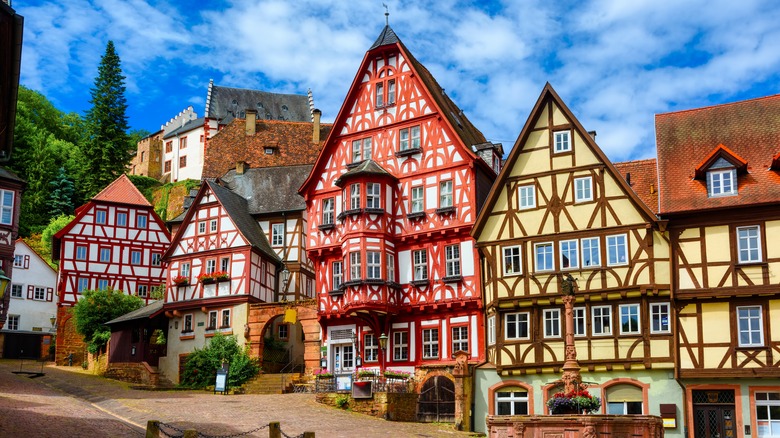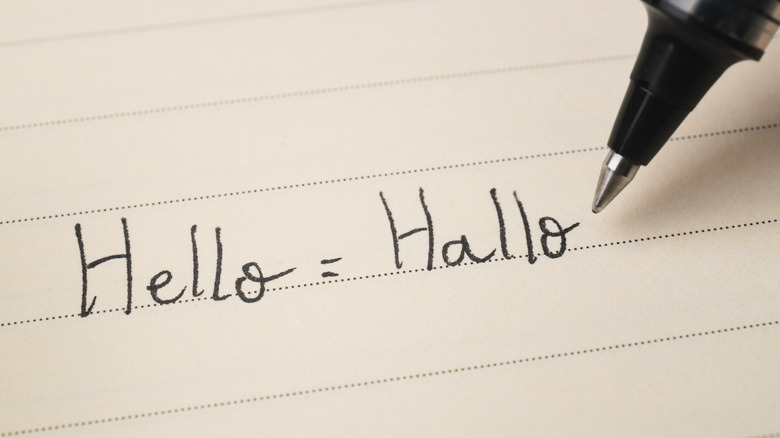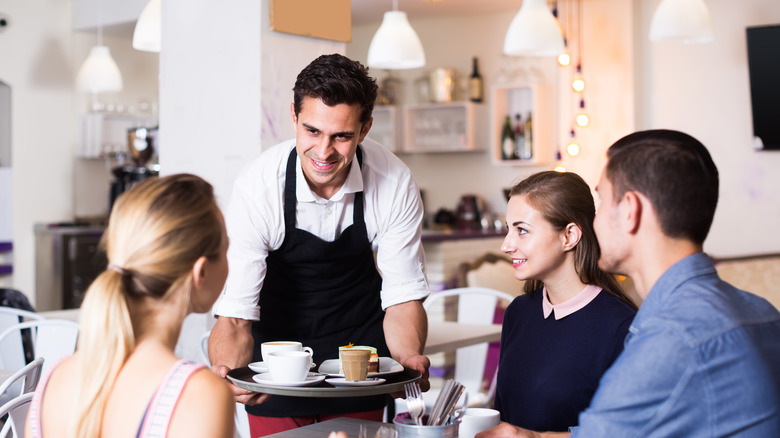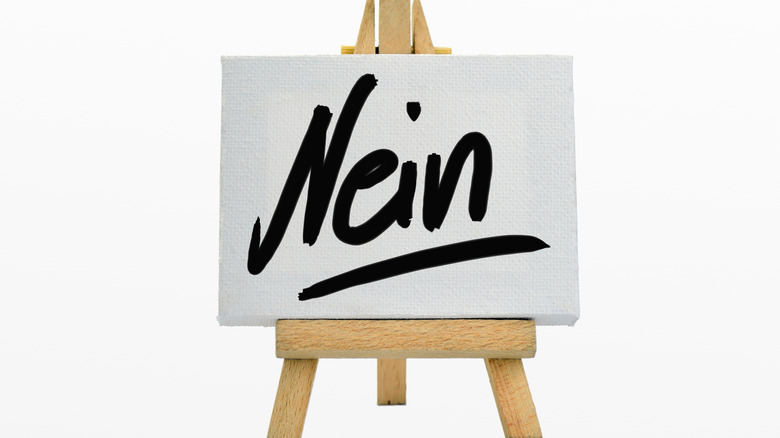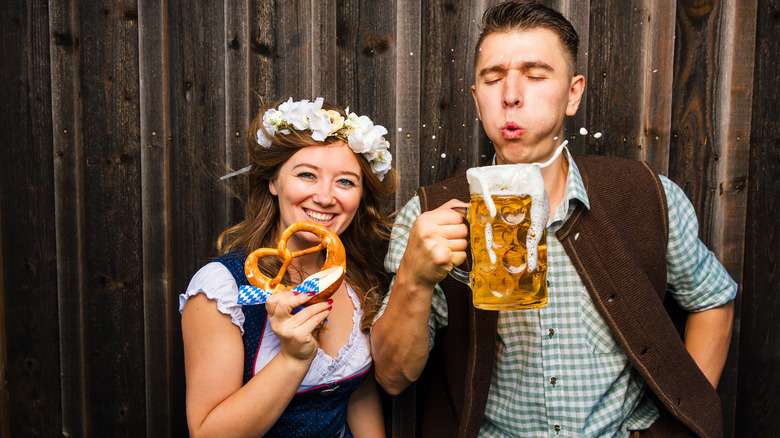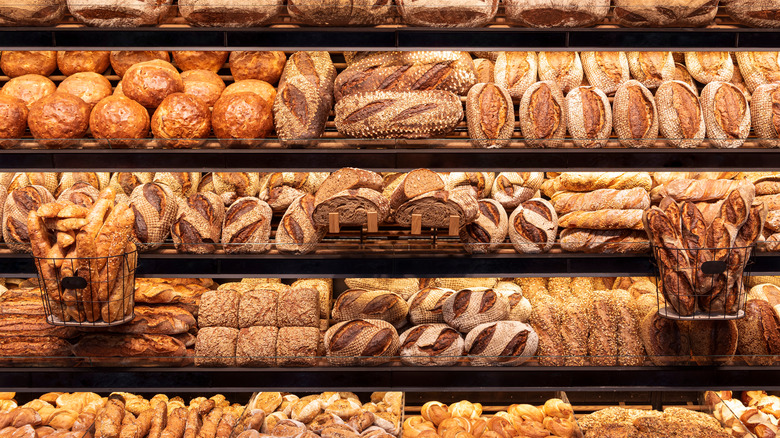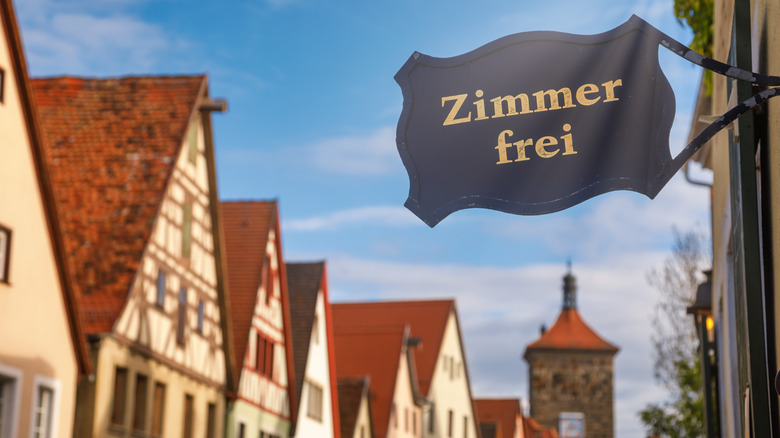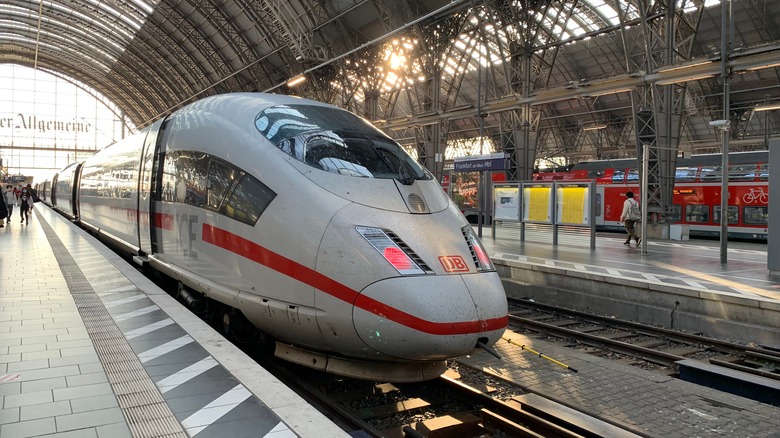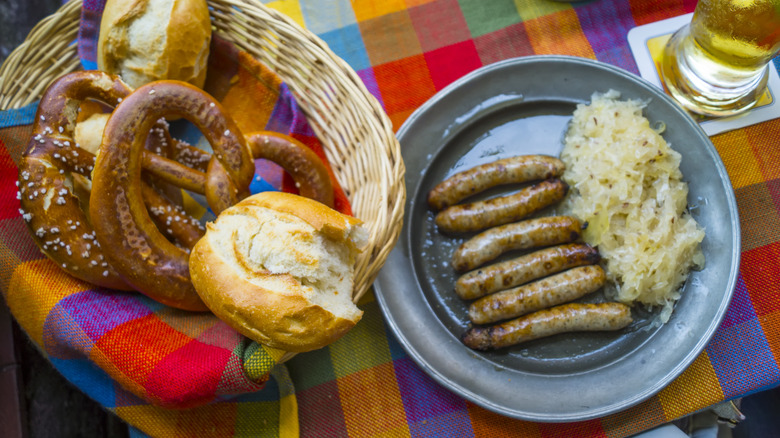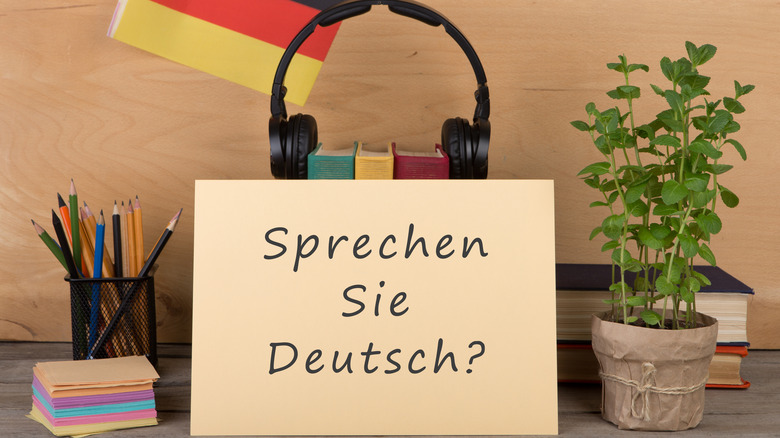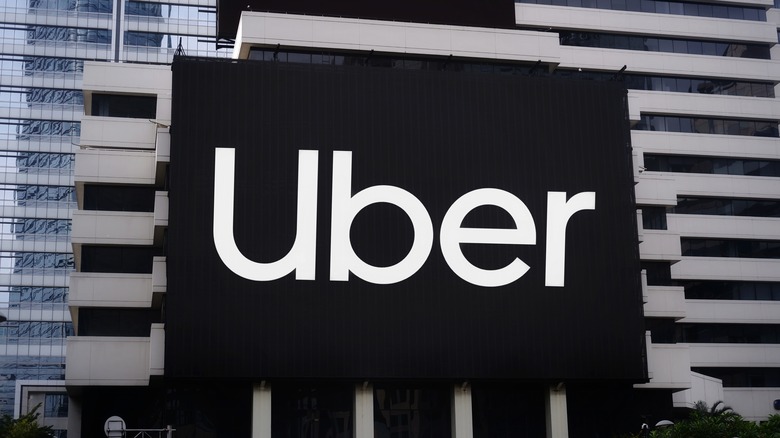Essential Words And Phrases To Know Before Your Trip To Germany
When you visit a country for the first time, it can be intimidating — especially if you don't speak the language. So getting to know a foreign language before visiting can take the pressure off of your trip and enhance your experiences. With a language like German, you're in luck because the words are generally phonetic like in Spanish. So words are generally spoken as they appear. Though that's not always true, it applies to many of the words or phrases beginner speakers will rely on during a trip to German-speaking countries.
There are some grammatical cues that might trip you up like the letter "ẞ" known as "eszett." This letter that looks like a "B" which isn't connected at the bottom is really just a double "s." So if you see a word like "Straße" think of it as reading as "strasse" (it means street). The same goes for the common umlaut or dots above a letter like "ü." It simply changes the pronunciation.
Don't be surprised if speaking or understanding German is different or difficult for you depending on what part of the country you're in. There are over 200 dialects in Germany that can really impact how you experience the language. Not to mention that many parts of Europe speak German: Germany, Austria, Belgium, Liechtenstein, Luxembourg, and Switzerland. So a language vs. dialect barrier might happen, just don't let it throw you off. Just do your best and it'll most likely be appreciated.
Greetings in German
Knowing how to greet other people in the country you're visiting should be at the top of your language learning list. You'll want to know how to say hi to folks or goodbye, even if it's all you manage to remember it's a nice start. A German "Hello" is actually a pretty easy translation for English speakers. You will say "Hallo" (/ˈhaloː/, /haˈloː/). This is the simplest greeting since it translates to just "hello."
Depending on the time of day, you could want to say some variation of "good day." Before 11 a.m. say "guten morgen" for "good morning," "guten tag" before sunset for "good day," and then "guten abend" for "good evening" after the sun goes down. These phrases are pretty common though folks tend to have different opinions on when you can start saying "guten tag" during the day. Not to worry though, you won't offend someone by saying it a bit later.
Although Americans probably know "Auf Wiedersehen" (meaning "goodbye") it's actually a fairly formal phrase. Consider not saying that to strangers and instead saying "Tschüss" for "bye" which is a neutral word. Even more casually you could say "bis bald" for "see you soon" or "Bis später" which means "see you later." Keep in mind that some variations of goodbye in German literally mean another time soon — "Bis später" literally means later that same day.
Being polite in German
Like German greetings, the simplest polite phraseology is fairly simple for phonetic language learners. Both "please" and "you're welcome" are translated as "bitte" (/BITT-uh/). Whereas "thank you" is just one word: "danke" (/DAHN-kuh/). Even being able to just use these words in everyday interactions makes an immense difference in your time in Germany. Generally German folks you will meet, especially shopkeepers, will appreciate that you've done the bare minimum of knowing the language because you're trying. You can also add these words to other phrases you learn to make the sentence more polite. Like saying "nein, danke" which means "no, thanks."
Keep in mind that part of being polite is recognizing that each culture has their own norms. In Germany, for example, small talk isn't really a thing, especially with people you don't know. So informal chatting with a server or a cashier is a little weird. Not making small talk can be uncomfortable for Americans, but just roll with it.
If you want to ask someone how they're doing you can say "wie geht es ihnen" for "how are you" or you could say the shortened "wie geht's" for "how's it going?" "Wie geht's" is a bit of a slang term though it's generally acceptable to use, though maybe use the more formal "wie geht es Ihnen" if you're not sure.
Variations of yes
The two easiest ways to give an affirmative or "yes" in German are the direct "yes" translation "ja" (/yah/) and "okay" which means "okay." Directness, especially if visiting Germany, is appreciated as the culture around conversation is a very direct one. While "ja" is acceptable when answering for "yes," you may want to kick your language skills up a notch. Even something as simple as "kein problem" for "no problem" or "klar" for "of course." "Kein problem" is not super common for non-German speakers to say, so folks might light up if you say this. It's also just fun to say.
When in certain situations, like answering a shopkeeper or restaurant server, there may be occasion for "das klingt gut" or "that sounds good." Or the more informal "also gut" to say "ok, good." But the second one should be saved for appropriate, less formal situations.
If you want an easy translation to remember, try to keep "natürlich" or "naturally" in the back of your mind. Clearly it's not the right "yes" for every situation, but "natürlich" is a fun word to sprinkle into your new German conversations.
Variations of no
Anyone who watched "Kim Possible" as a kid might already know how to say "no" in German thanks to Ron Stoppable asking Heinrich if he had any daughters he could take to a dance. To which Heinrich replied "nein" but Ron thought he meant "nine" and Heinrich had to explain that "nein means no!" If that phrase means nothing to you, saying "no" in German is as simple as "nein" (/nine/). You can make the "no" more polite by adding "thank you" to it and say "nein danke" (/nine DAHN-kuh/) for "no, thank you."
Should you need a more firm "no," you could try saying "ich glaube nicht" or "I don't think so" or the firmer "absolut nicht" for "absolutely not." Otherwise perhaps a more gentle let down using "leider" for "unfortunately, no" is appropriate. Both of these phrases can get the point across that you are final in your stance and that the situation is "kaputt" ("broken"). Generally you shouldn't have a problem with shopkeepers. Especially in a country like Germany saying "no" will complete your conversational transaction. It's actually a relief to not have to deal with pushy salespeople like in the United States.
German restaurant lingo
Especially in larger cities like Berlin, there's a good chance you'll have access to an English menu or restaurant staff who speak a little English. But being able to order or ask for something in German is never a bad thing. Starting with the three meals of the day, you can say "breakfast" with "frühstück" (/FRUU-shtuuk/), "lunch" is "mittagessen" (/mit-TAHK-ess-en/) and "dinner" with "abendessen" or "abendbrot" (/AH-bent-ess-en/ or /AH-bent-broht/). More literally "abendessen" means "dinner" while "abendbrot" actually means a "light supper."
For folks with dietary restrictions or needs, there are some phrases you'll want to have on hand for restaurants too. For example: "I am a vegetarian" is "ich bin Vegetarier" (/ikh bin vay-gay-TAH-ree-er/) or "I only eat Kosher food" is "ich esse nur koscher" (/ikh ESS-uh noor KOH-sher/). If you cannot remember how to say you can't eat something, you could try saying "nein" and point to the food item you cannot eat. However, your best bet is to bring a little translation card with your restriction on it so you're covered.
If you haven't received a menu but you want one, you can ask the server to bring one to you by saying "ich hätte gerne die Speisekarte" or "can I look at the menu, please?" You can also ask if there is a house specialty by asking "gibt es eine Spezialität des Hauses?" or if there are local specialties by asking "gibt es eine Spezialität aus dieser Gegend?"
German shopping terms
While many of us don't necessarily need help when shopping, especially those introverts out there, but you'll never know when these phrases will come in handy. For instance, being able to say "I'd like" with "Ich möchte". (/eech MURG-ta/) followed by whatever it is you're looking for. You could be looking for a "shirt" or "ein Kleid" (/eye-n KLITE/) or even a "postcard" or "eine Postkarte" (/eye-na POST-KAR-ta/) to send home. Luckily, in some circumstances, you can show the person what you're looking for in the shop and come up with a way to cross the language gap with some creative phrasing.
Clearance shoppers will want to look for some words to give a clue that the prices have been lowered. So keep an eye out for "ausverkauf" for "sale," "sonderangebot" for "special offer" or "reduziert" which means "reduced." Usually, the universal color for reduced prices is red so watch out for red signs that say any of the reduced priced signs in red.
Some of the shop titles you'll see frequently are worth remembering too so you don't wander to far looking for something. For example "e Bäckerei" means "bakery" which may or may not have the kinds of sweet treats you'd want from a "pastry shop" or "e Konditorei." Most likely a bakery will have breads or pretzels but not necessarily a lot of sweets. Also, "e Apotheke" stands for "apothecary/pharmacy" whereas "e Drogerie" or "drugstore" is a non-drug convenience store.
Travel words in German
Sometimes you just need to know the word for certain things when you're traveling. From "the airport" or "der Flughafen" (/dare FLOOG-hafen/) to "the train station" or "der Bahnhof" (/dare BAHN-hof/) you may need to know these words when getting around. Knowing words like this will also help you read signs as you're traversing whatever German-speaking countries you're visiting. You'll be glad you know the word for "train station" when you're wandering around and can read the signage. Luckily some signs have little icons on them to give you a hint if you aren't sure. Though you shouldn't assume they'll have that.
If you're looking to make reservations in person you may also need to know the words "Haben Sie?" (/HAH-ben zee/) which means "do you have" which will then be followed by what you're looking for. For example, "ein Mietwagen" (/eye-n MEET-vahgen/) for "rental car" or "ein Zimmer" (/eye-n TSIM-air/) for "a room." As always, making reservations ahead of time is usually your best bet to get the best value. However, if you're in a bind, being able to ask for what you need in German will only help you.
Asking for directions in German
Especially since phones can get us lost as quickly as they can help us find where we're going, it's always good to know how to ask for directions. When you want to ask "how do I get to a place" you can say "wie komme ich zum/zur" (/vee KOM-muh ikh tsoom/tsoor/). But if you're trying to ask how to get to a city you'd say "wie komme ich nach" (/vee KOM-muh ikh nahkh/). Hopefully, you won't need to ask a stranger how to get to a city, but you never know!
Like many countries, the "toilet" or in German "die Toilette" is directly used. Don't ask for a bathroom or a restroom, just ask for the toilet. You may also see signs that say WC for "water closet" or "das Klosett" which is another word for "lavatory" or "toilet area."
If you want to ask someone for recommendations you could ask "where are there a lot of?" to get pointed in the direction of a popular area. Try asking "wo gibt es viele" (/VOU gipt ess FEE-luh/) followed by words like "Kneipen" for "pubs" or "Sehenswürdigkeiten" for "sights to see." Oftentimes locals will have gems you'd never discover without asking them what to check out.
German food words
One of the best things to do in German-speaking countries is to eat all of the delicious food. There are several words or phrases that are easy to remember like "wasser" (/vasser/) for "water" or "wein" (/vine/) for "wine." Other words like "apfelstrudel" (/apfelstrudel/) which means "apple strudel" is pretty straightforward for English speakers who already know how delicious strudel is.
Some words you may want to remember for breakfast include: "der Kaffee" ("coffee"), "der Joghurt" ("yogurt"), "der Keks" ("biscuit"), and "der Orangensaft" ("orange juice"). Though you shouldn't be afraid to try traditional breakfasts either. In Germany that might mean a Farmer's Omelet or "Bauernomelett" while in Austria it might be "Quark Käse" (soft Austrian cheese) with "Apfelradln" (apple rings).
Keep in mind too that a lot of countries love sparkling water. It's possible if you don't specify that you want "Leitungswasser" or "tap water" you'll get "der Sprudel" or "sparkling water." Honestly, the sparkling water often tastes so much better than the tap water. Even if you aren't big on seltzers, you may want to give it a try at least once while abroad. Especially flavored waters you can get at a store. Gerolsteiner is just so good.
How to explain your language skills
When you're a new language speaker, knowing how to ask someone if they can speak English might come in handy. If you're stuck, try saying "sprechen sie Englisch?" (/shpr-ek-en zee eng-lish/) to maybe bridge the language gap. If you feel uncomfortable asking, it's okay to also say "excuse me" before asking by saying "entschuldigung" (/ent-shool-dee-goong/). While it literally means "excuse me," it is also a way of saying "I'm sorry." Otherwise "tut mir leid" which is a shorter "sorry."
If you want to try out your language skills but need your German-speaking conversation partner to repeat themselves, it's ok to say so. Feel free to say "Können Sie das bitte wiederholen" or "could you say that again please?" You could also say "Was bedeutet das" or "what does that mean?" to spur your speaking partner to rephrase what they've said more simply.
When you get to a place when you can't converse in German, which is understandable you're a new language speaker, just admit your limit of language skills. Say "Ich spreche nicht gut Deutsch" for "I do not speak German very well." Seriously, being able to say your language skills are limited in the language of the place you're visiting is so much better than immediately asking if the other person speaks your language.
German words you already know
Believe it or not, there are several German words (even if you don't use them frequently) that you already know. While this might not help you during your travels, it's fun to see how words cross over languages and cultures. For example, "angst" is a word we're all familiar with and it translates to "fear." Or "doppelgänger" which literally translates to "double walker" but means a person who seems or looks exactly like someone else, almost like a ghost.
Even a term like "sauerkraut" hasn't changed from its original spelling or meaning from its German context to English. The same is true for "poltergeist," "zeitgeist," "kindergarten," "Volkswagon," or even "strudel." You absolutely have to get strudel at whatever German-speaking country you visit. It'll be unforgettable.
Some of the words you're already familiar with, especially "über," could really come in handy during your travels. You may find yourself coming up with ways to include these words you know into your conversations though we're not sure how many poltergeists you plan on seeing on your vacation.
